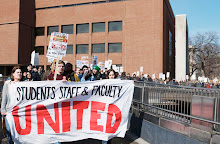
Please join FRPE and the Education Action Coalition for an exciting conversation about the challenges facing higher education today.
Reclaiming the University: Fulfilling our Promise to Students and the Public
Thu, Sep 30, 5:00-6:30pm
Free and open to all
U of M, West Bank
Blegen Hall, room 5
We are told that the university is in crisis. The administration claims the crisis is created by reductions in public support. Yet even before the recent cuts in state appropriations, the University was doing a poor job fulfilling its educational mission as a land-grant institution. Skyrocketing tuition has limited access to our state’s flagship university, the milking of tuition-generating units to fund initiatives unrelated to education has diminished the quality of instruction, and the pursuit of private sources of revenue has compromised the institution’s ethics and academic integrity. This critical conversation about higher education will illuminate why higher education is failing the public, and consider how collective action can change this situation.
Speakers:
Carl Elliott, Professor, Center for Bioethics, University of Minnesota
“A Fatal Drug Study at the University of Minnesota and Why It will Happen Again” - on the tragic story of Dan Markingson, a mentally ill young man who died in a clinical trial conducted at the University of Minnesota. The case exposes stunning ethical lapses at the U, lapses that are likely to recur without major structural changes.
Gary Rhoades, General Secretary of the American Association of University Professors
“Reclaiming the Public Promise of Public Higher Education” - on how prioritizing private, institutional, and corporate interests in pursuit of revenue and rankings has undercut the public responsibilities and functions of public universities.
Sofia Shank, campus activist and Women’s Studies major at the University of Minnesota
“The Legacy of Bruininks’s ‘Strategic Positioning’: Tracing the Direction of the University” - on the consequences of strategic positioning for students at the University of Minnesota, and organizing for change.
Moderated by Karen Ho, Associate Professor of Anthropology, UofM

